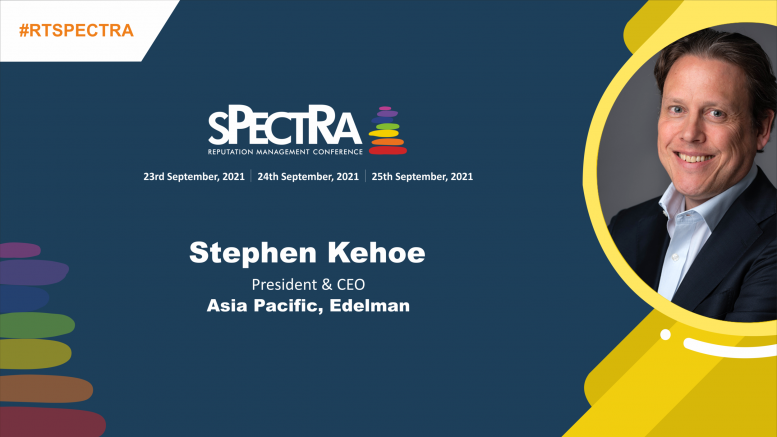Trust isn’t easy to build both personally and professionally. It develops slowly, typically after a lot of effort and planning and today, with the ‘new normal’, and remote working style, it has become quite difficult. “Why Trust is the currency in an unpredictable new world” was the topic taken up by Stephen Kehoe, President & CEO – Asia Pacific Edelman.
He joined Edelman in January 2018 as Global Chair of Reputation, which included steering the work on the annual Edelman Trust Barometer. He explained that he will focus on trust in an ever-changing volatile world and how professional communication is about creating, keeping, measuring trust on behalf of their clients. This topic is also about how communication and marketing teams need to work differently, he pointed out and added that having worked in the communication business for over thirty years, he has an opinion on almost everything!
Brands need to think more smartly
Firstly, he suggested that brands need to get their act together and need to think more smartly about their impact on people. Secondly, there is the need for corporate communication professionals to understand their clients and also to be in the business of building brand equity by creating strategies focused on people. “Brand equity is not just for marketers and today, brand value is driven by trust; and trust has clear dimensions grounded on purpose, dependability and reliability, which can be influenced by the role of the corp comm function,” he pointed out and went on to say that the work they are doing on trust is now broadened from analytical work to an algorithmic model which can tell you why your product or enterprise is trustable or not. In Edelman, they ask everyone to build trust strategies, because “if you are thinking about whether your brand is trusted, it should be now,” he shared.
Today, everything is different, the “world has rocked”, as he put it. We live in anxiety, people are fatigued, confused by evolving values, the planet faces the urgency for change, there’s the commerce disruption that has propped up the ability to shop anywhere; and then we have the media and the search for truth; in fact the very nature of media has been transformed forever. All this has changed the way people think about whom they should place their trust, and it is “important because trust is all about holding a certain belief in the future”. In fact, he presented an insight, quite precisely – “It is hope made tangible and it conveys a willingness to accept uncertainty, enables smoother, deeper, meaningful relationships”. Trust is both a rational and an irrational business both from the conscious and unconscious biases, all of which can be influenced. “Relationships without trust, simply fail,” was his strong conviction.
In a commercial context, lasting trust is the strongest lasting insurance against competitive disruption. In the best trusting relationships there is mutuality, commitment and growth for both. The world has never needed a stronger reason to believe in the future like it does now, he noted.
The new Trust Dynamic
At Edelman, the new currency for clients and business is – the new Trust Dynamic. Trust builders need to understand the world of communications – understand the power of employee engagement and how products need more impact on consumers. A shining example is Colgate brand which did that by building trust through purpose and action. It validates the Edelman Trust Model measuring trust on four parameters – ability, dependability, reliability and search for value or purpose.
Trust creates value and trust drives growth. Being a trusted brand makes every investment work harder. Trust building requires us to design and produce work that is brave and brought to life through powerful creatives that leverages the full force of earned, owned, shared and paid media, he explained and went on to say that communication leaders need to encourage their businesses to live up to – storytelling & story sharing, conviction & commitment, and they must be always on, always adapting. Royal Enfield was a good example of building trust through owned media, and it engaged its customers through the lines of adventure and exploration, making it a lifestyle and go-to brand for people.
Then there is the increasing need for brands to take a stand on issues which people care about. This is indeed a difficult area for brands, but Babyshop did it with elan as it took up the challenge to stand with Arab mothers
Trust is the new currency
So, trust is the new currency and in India the Trust report revealed that 77% respondents said it’s important to trust brands they use; 50% said they love some brands but do not want to some brands because they do not trust the companies.
So, the call for a new Trust Dynamic is very valid now – growing inequalities in trust are impacting consumers and consumer behaviour. Trust is definable and measurable – what gets measured gets done, so how strong is your trust capital? Trust built round engagement and purpose is required that spreads actions across all stakeholders. And lastly, trust drives value and growth, for focusing on trust is to focus on business success.
In the Q/A session, Rachana Panda, Bayer asked how communication and marketers can work together? Pat came the answer from Kehoe – the clarion call is for marketers and communication professionals to get together, and understand trust is a central component.
Trust in government had dropped after the pandemic hit us, but he noted that India was an exception, as in the 2021 poll it had risen to the top slot for the first time in twenty years! It is good news for business with a world of opportunities opening up.
The views and opinions published here belong to the author and do not necessarily reflect the views and opinions of the publisher.






Be the first to comment on "SPECTRA 2021: Why Trust is the currency in an unpredictable new world."